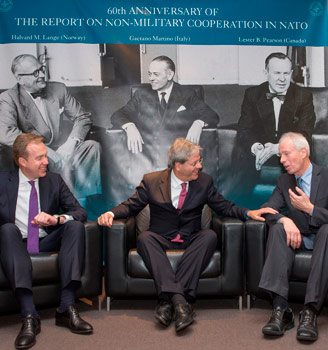The NATO Archives marks the 60th Anniversary of the Report on Non-Military Cooperation
The end of 2016 saw the NATO Archives fully implicated with events commemorating the 60th anniversary of one of the most important texts in the history of the Alliance. Approved by the North Atlantic Council on 13 December 1956, the Report on Non-Military Cooperation in NATO is a landmark document whose principle recommendations laid the foundation for NATO’s evolution toward increased political consultation amongst its Allies.

The report was the result of a collaborative authorship between Lester B. Pearson, Gaetano Martino, and Halvard Lange, the three Foreign Ministers of Canada, Italy and Norway, respectively, who were tasked in May 1956 to “advise the North Atlantic Council on ways and means to improve and extend NATO cooperation in non-military fields and to develop greater unity within the Atlantic Community.” Collectively and affectionately known as NATO’s “Three Wise Men”, they conducted bilateral interviews and sent out questionnaires to all 15 NATO Allies to investigate how the Alliance’s security policy could be broadened with non-military tools. The recommendations that emerged from the report, emphasizing political, economic, cultural, and scientific cooperation amongst member countries, would have long-lasting implications for NATO that continue to resonate today.
On 30 November 2016, the NATO Archives celebrated the anniversary of the report during the meeting of the Archives Committee at NATO HQ with the launch of an exhibition showcasing a unique collection of publicly disclosed archival documents and photos related to the work of the Three Wise Men. All of this material was selected and arranged to illuminate the historical and political contexts that surrounded the drafting of the famous report. The exhibition, opened by Wayne Bush (Assistant Secretary General for Executive Management) with closing remarks by Ambassador Tacan Ildem (Assistant Secretary General for Public Diplomacy), also featured a unique gathering of special guests to introduce the authors of the report. The Permanent Representatives to NATO of Canada (Ambassador Kerry Buck), Italy (Ambassador Claudio Bisogniero) and Norway (Ambassador Knut Hauge) each delivered biographical overviews of their country’s respective “Wise Man” to highlight not only the importance of their work on the report, but also to illuminate their distinguished political careers.

The following week, the NATO Archives “Three Wise Men” exhibition was incorporated into the preparations for the Foreign Ministers meeting at NATO HQ that took place on 6-7 December 2016. Installed in the main conference hall, the exhibition served as a potent reminder of the historical and continuing importance of political consultation during the Ministerial meeting. To punctuate this bridging of the past with the present, the exhibition’s central image of the Three Wise Men in repose was used as the backdrop for an extraordinary photo session with the then-current Foreign Ministers of Canada (Stéphane Dion), Italy (Paolo Gentiloni) and Norway (Børge Brende) as they sat in identical poses as their predecessors.
Finally, the “Three Wise Men” exhibition provided the historical documentation support for “Euro-Atlantic Security: More Than Just a Military Matter”, a special event presented by Carnegie Europe that focused on the contemporary relevance of the report on its 60th anniversary. Held at Norway House in Brussels, Belgium on 13 December 2016 (the actual anniversary date of the report), this high profile event gathered NATO diplomats, European Union officials, think tank representatives and members of the international press for a lively symposium that included a keynote address by NATO Secretary General Jens Stoltenberg and a panel discussion revolving around a new paper written by Carnegie Europe’s Judy Dempsey entitled “From Suez to Syria: Why NATO Must Strengthen its Political Role”. The event also featured closing remarks delivered by NATO Deputy Secretary General Rose Gottemoeller, who graciously acknowledged the NATO Archives for “helping to pull together historical information to enlighten and strengthen our discussions” throughout these commemorative events. Her final words of gratitude held particular significance for the NATO Archives, as she concluded by recognizing the importance of archivists “not only for recollection and history but also bringing a new generation along in what they need to learn about national security”.
